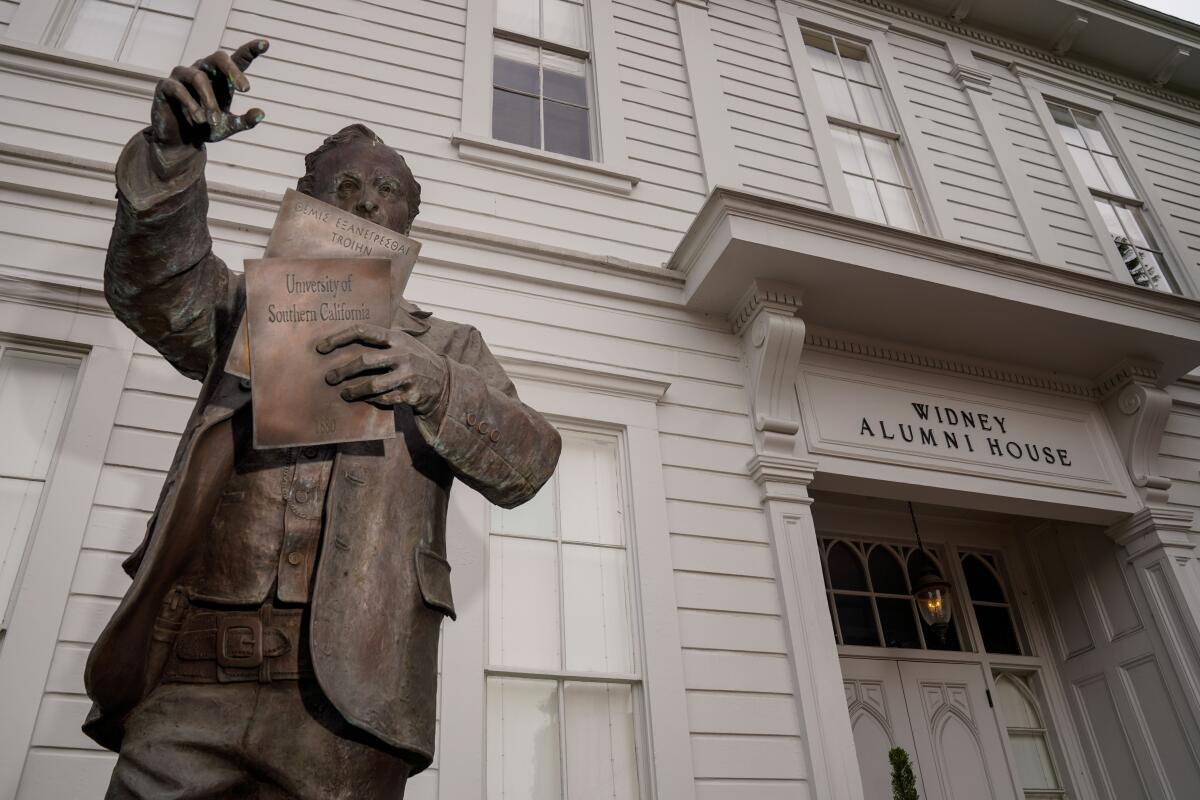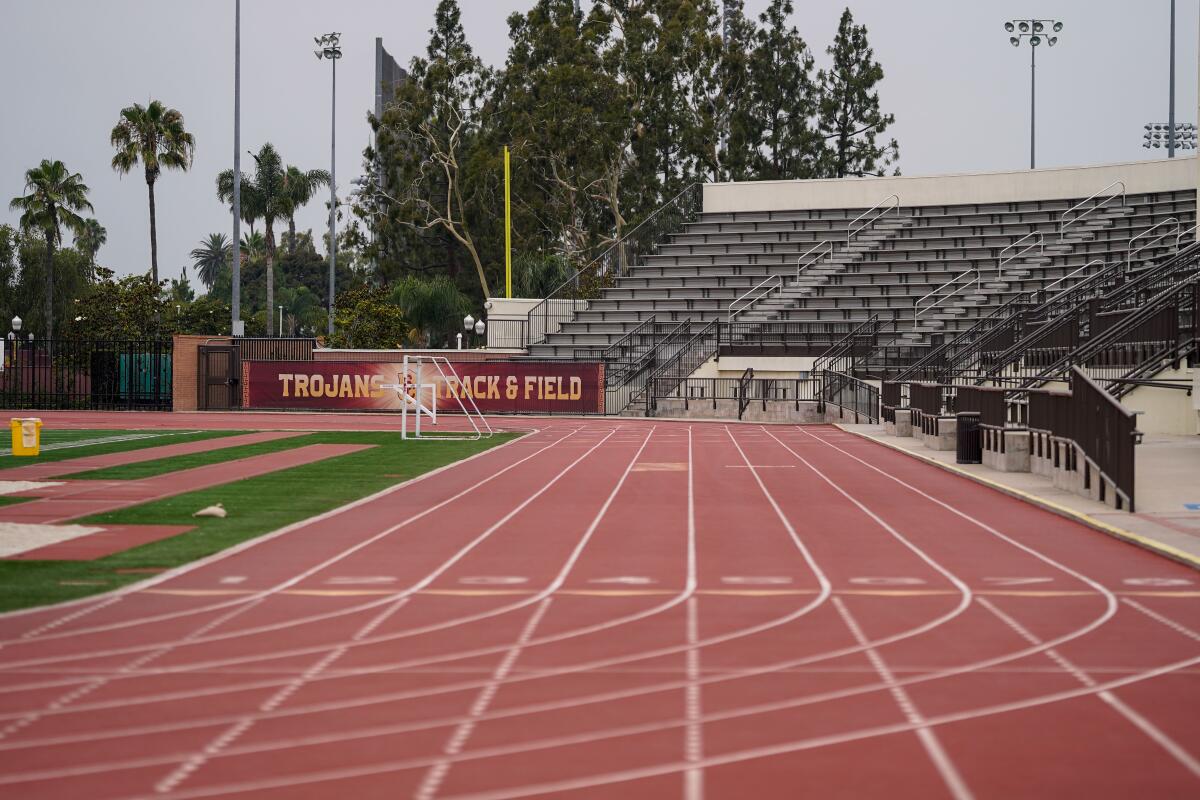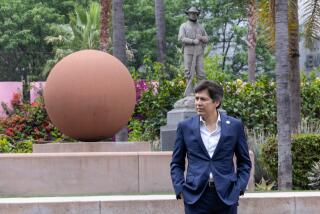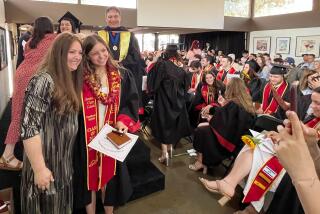USC must ‘reckon with its history of white supremacy’ in its namesake sites, some say

As protests over the police killing of George Floyd raged across the nation, USC removed the name of one of its most influential leaders from a landmark building on campus.
The decision to strip the name of its fifth president, Rufus B. von KleinSmid, a eugenics leader, from among its tallest buildings brought cheers. President Carol Folt said the name removal was necessary because his beliefs were “at direct odds” with the university’s values.
For the record:
5:08 p.m. July 6, 2020USC tributes: In the July 4 Section A, an article that examined several of USC’s namesake tributes said Bill Tierney is the co-director of the Pullias Center for Higher Education. He is the former co-director.
But weeks later, some students and others are raising questions about a host of names and symbols on campus, examining whether they too should be purged at this historic moment of reckoning. The emerging debate is shaping up to be a test of whether the tradition-bound university is willing to break with other pieces of its history and address wrongs of the past.
“Names matter,” said Paula Cannon, a professor of molecular microbiology and immunology, and co-chair of a task force looking at building names. “And sometimes, it’s not enough to just say it was a long time ago.”
The USC discussion reflects nationwide movements to acknowledge or bring down symbols and names associated with racism. Late last month, for instance, Princeton University removed the Woodrow Wilson name from its public policy school, citing his racist views and policies. Across California and the nation, Confederate-linked statues have fallen.
USC has yet to publicly address the pasts of three prominent leaders who expressed racist views or were involved in disturbing acts: Joseph Widney, USC’s second president; his brother and USC founder Judge Robert Widney; and track and field coach Dean Cromwell.
In a public letter announcing its support for the Black Lives Matter movement, the Trojan Knights, a student-run organization tasked with being USC’s “guardians of tradition,” called on the university “to reckon with [its] history of white supremacy” citing, among other concerns, the writings of Joseph Widney.
“It’s undeniable that [Joseph Widney] had an outsized influence on building USC, but that doesn’t mean we need to memorialize him,” said Anav Saxena, the group’s president.
Joseph Widney’s university bio credits him with establishing the medical school and leading USC through difficult financial times. Absent from it, however, was his 1907 book, “Race Life of the Aryan Peoples,” which analyzed white superiority in the United States. He wrote that Black and white people “cannot live together as equals.”
Before Widney’s writings, his brother had ties to a vigilante group. David Torres-Rouff, a professor and historian at UC Merced, said Robert Widney was “most certainly” supportive of extralegal lynchings. A statue in Robert Widney’s honor stands in front of the Widney Alumni House, USC’s oldest building, which is named after him.
In the weeks since George Floyd’s death, amid nationwide protest the sports world was forced to revisit a legacy of insensitive mascots, songs and cheers.
Cromwell, the track and field coach during Von KleinSmid’s administration and an assistant at the 1936 Olympic Games in Nazi Germany, is associated with the removal of two Jewish athletes from its relay team in a move some Olympic runners later said was fueled by anti-Semitism. He also described Black athletes as “primitive” in a book. The university track and field is named in his honor.
“The Task Force on University Nomenclature is looking at buildings, monuments, and symbols across campus,” USC said in a statement to The Times this week. The university did not comment on the Widney brothers or Cromwell.
Camilo Daza Manga, a student on the task force, said the committee presented procedural recommendations for handling calls to de-name and rename sites in March, and that the Widney and Cromwell names would “definitely warrant a look” if USC follows the principles set forth by the group.
“We’re on a campus that lacks recognition of other ethnic and racial pioneers that better reflect the university’s values than the cases you presented,” he said. “Absolutely.”Widney Brothers
Robert Widney’s USC bio places him in the “rough and tumble frontier town” of Los Angeles and credits his perseverance as a university founder in 1880. When erecting a statue to honor him in 2014, then-President C. L. Max Nikias praised him for saving a group of Chinese immigrants from a deadly mob in 1871.
Yet his involvement in the Home Guard Vigilance Committee in the late 1800s suggests a more controversial facet of his Los Angeles legacy. At the time, vigilante groups were prevalent in the young city and often targeted Native Americans and people of color, according to multiple historians.
“They were taking laws into their own hands,” said Bill Tierney, co-director of the Pullias Center for Higher Education at USC. “We shouldn’t heroize people and say they’re the greatest guys in the world and that they didn’t make any mistakes, because that’s not true.”
Historian Torres-Rouff recommends a more honest assessment of a namesakes’ past.
“If you’re going to pay homage to someone who’s part of your history, you need to recognize that people are complicated and that just because 150 years have passed doesn’t mean we only remember one shining moment and forget the rest,” he said.
Tierney described the racial beliefs Joseph Widney espoused in his book as “repugnant,” citing them in a 2018 article asking universities “to confront their past, not omit it.”
“The Black and the White could live together with the White as master – tho to the harm of the White man even more than of the Black; but they cannot live together as equals,” Widney wrote in the book, which also described Native American people as savages. Coach Dean Cromwell
Nearly four decades after the Widneys, Dean Cromwell, the track and field coach who led USC to 12 NCAA championships and assistant coach at the 1936 Olympic Games, expressed anti-Black views and was criticized for what some said were anti-Semitic actions.

At the Olympics, he was among the coaches who eliminated Jewish runners Sam Stoller and Marty Glickman from the relay team. Instead, Ralph Metcalfe and gold medalist Jesse Owens, both Black athletes, replaced them for the race.
“What is absolutely clear is that the move was made to spare Hitler and Nazi Germany the embarrassment of having Jews standing on the podium,” said Rabbi Abraham Cooper, director of the Simon Wiesenthal Center, an international Jewish human rights organization. “And if that isn’t anti-Semitism, I don’t know what is.”
For Cooper, Cromwell and the coaches’ actions aligned with the sentiments of the American Olympic Committee President Avery Brundage, whose bust is being removed from the Asian Art Museum in San Francisco after activists accused him of having Nazi sympathizer views.
Stoller later revealed that Cromwell had opposed the substitution because he “wanted an all-white relay team.”
Cromwell wrote in his 1941 book “Championship Techniques in Track and Field” that “the Negro athlete excels because he is closer to the primitive than the white athlete.”
“It was not so long ago that his ability to sprint and jump was a life-and-death matter to him in the jungle,” he wrote.
Like several Black track athletes approached by The Times, sprinter and hurdler Mecca McGlaston, who graduated from USC this year, said she was unaware of Cromwell’s comments. She believes that his name should be removed from the field.
“They tried to discredit a lot of Black athletes, and that quote is a prime example of it,” she said. “As far as history, history’s going to repeat itself if it’s not brought to the surface.”
More to Read
Sign up for Essential California
The most important California stories and recommendations in your inbox every morning.
You may occasionally receive promotional content from the Los Angeles Times.












